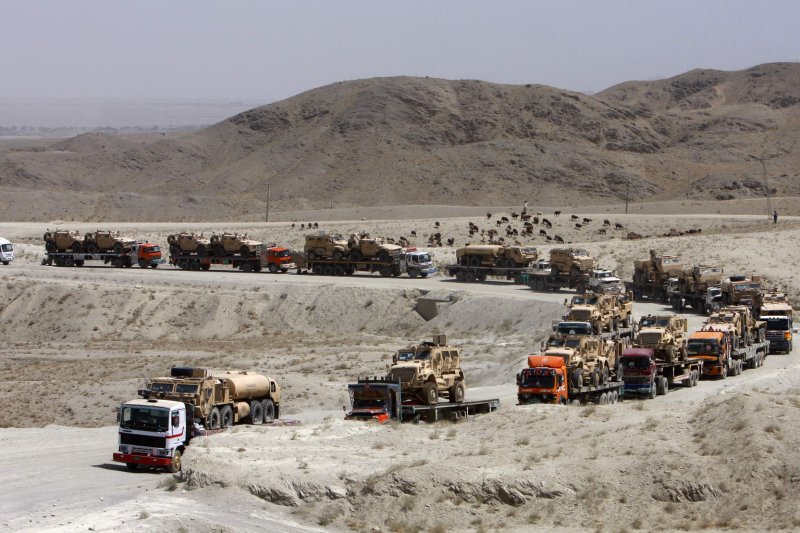Pakistani trucks carrying NATO and U.S military vehicles cross the Quetta Chaman highway at Kojak Pass border area after leaving the southern Afghanistan province of Kandahar near Chaman, Pakistan on July 25, 2013. The trucks head to the port of Karachi, Pakistan as the pullout continues, ending a NATO/USA decade-long military combat involvement in Afghanistan by the end of 2014. There are approximately 60,000 American troops in Afghanistan at present. UPI/Matiullah Achakzai |
License Photo
KABUL, Afghanistan, Nov. 21 (UPI) -- Afghan President Hamid Karzai said Thursday he might not sign a security pact with the United States until 2014 even if it is ratified this week.
"If you approve this agreement, I want this agreement to be signed after the presidential elections," Karzai told the country's grand council of elders after their meeting opened, The New York Times reported.
"If you agree to sign this agreement with the Americans, we will ask for some time," Karzai said.
The agreement seeks to allow U.S. and NATO forces in Afghanistan beyond their scheduled withdrawal of December 2014.
A delay would postpone Karzai's signature on the agreement until after Afghan elections in April. Karzai did not specify whether he would sign the deal before his successor takes office in May 2014. If that were left to the new president, he could ask for new concessions.
The decision by about 2,000 elders attending the country's traditional Loya Jirga will determine how many U.S. forces will remain in Afghanistan after U.S. and NATO-led coalition forces end their combat operations by the end of 2014.
The meeting in Kabul is expected to last four days.
Specifically, the Loya Jirga called by Karzai will consider the draft of the Bilateral Security Agreement, which took months to negotiate and whose final language was reached only hours prior to the start of the meeting. If the draft, containing two key provisions demanded by the United States and hotly debated throughout, is not approved, the Obama administration may go for the "zero option" of not leaving any U.S. troops behind, the report said.
The two provisions relate to allowing the residual American forces to conduct searches of Afghan homes as part of their anti-terrorism efforts and to exempt U.S. forces from Afghan laws for any crimes they commit, making them subject to U.S. law only for trial.
The BBC, citing the draft deal, said Karzai, whose bargaining position had been a major stumbling block for U.S. negotiators over these provisions, appeared to have accepted the jurisdiction of U.S. laws demand.
"Afghanistan authorizes the United States to hold trial in such cases, or take other disciplinary action, as appropriate, in the territory of Afghanistan," the document said.
The United States had agreed troops would not "target Afghan civilians" for home searches but would have the right to enter Afghan homes. However, the BBC quoted a U.S. official as saying the previously agreed phrase "extraordinary circumstances to protect American lives" for entering the homes was not included in the final draft, which was reached late Wednesday local time after another round of telephone conversations between Karzai and U.S. Secretary of State John Kerry.
If the draft is approved, as many as 15,000 foreign troops could remain in Afghanistan after 2014, Karzai has said.
Karzai told the delegates the only issue was whether the agreement would be signed, and urged the elders not to discuss any other agenda.
The draft called for the agreement to go into effect at the start of 2015 and continue at least until the end of 2024, unless terminated through mutual consent and with two years notice.
The Times said keeping U.S. forces would mean billions of dollars of international assistance, which Afghanistan sorely needs. Under the agreement, the U.S. forces will only play a support role in Afghanistan except when al-Qaida is involved.
The report said critics of Karzai in Afghanistan see him as a political agent of a long-term foreign military presence in the country. U.S. President Barack Obama, meanwhile, must explain to his nation, already tired of the longest war in its history, why the U.S. military presence should continue in Afghanistan.
Separately, The Wall Street Journal said NATO wants to reach a similar deal with Afghanistan and can use the Afghanistan-U.S. security agreement as a model. NATO members including Germany and Italy plan to keep some of their forces beyond 2014.
The Taliban, however, strongly oppose any foreign forces staying on in Afghanistan and have vowed to fight them.
Amrullah Saleh, former head of Afghan Intelligence, told the BBC he is confident the agreement will be accepted.
"The only thing that gives me high confidence and hope that this will not be a goodbye Jirga, but it will be a Jirga bonding the two nations together is that the stakes are high for the two nations," he said. "Abandoning a country as strategically located as Afghanistan will be committing the mistakes of previous world powers ... the mission is not finished."















